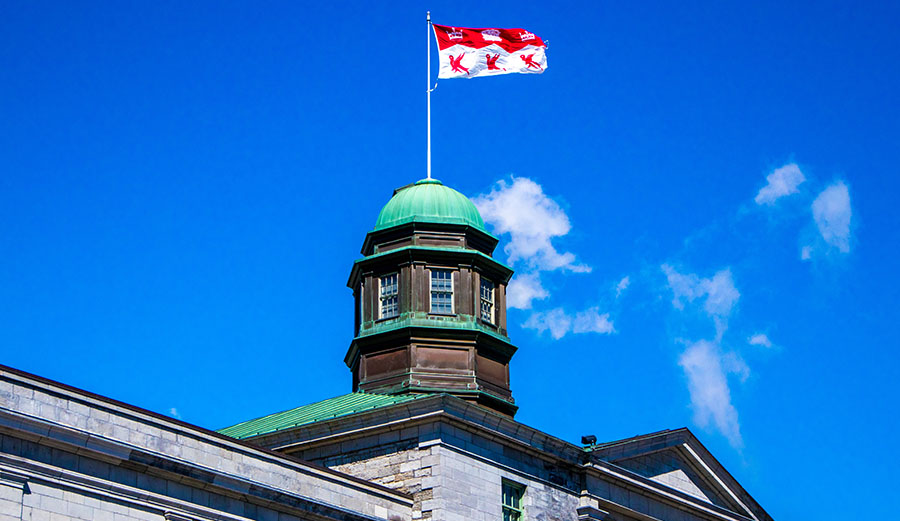The Arts Undergraduate Society of McGill (AUS) held its fourth legislative council meeting of the semester on Feb. 27. Concillors debated the concerns presented by Héma-Québec’s blood drives on campus and policies restricting donations from men who have sex with men through a three-month deferral period.
Several members of the council expressed dissent following the introduction of a motion on Feb. 27 to Acknowledge the Role of Blood Collection Services on Campus and to Encourage the Continued Advancement of Non-Discriminatory Policies. In response to a motion presented during the AUS’s last general assembly condemning the presence of Héma-Québec on campus, this new motion regarding Héma-Québec sought to condemn only the organization’s discriminatory policies while continuing to make them feel welcome at McGill. Many AUS representatives believe that this new motion was not in the best interests of McGill students and feared the repercussions of creating spaces on campus for an organization that possesses discriminatory policies toward 2SLGBTQIA+ people.
The motion brought forth by the Society of Linguistics Undergraduates at McGill Vice-President (VP) External Mathieu Hergett-Rozier, and seconded by The Canadian Studies Association of Undergraduate Students (CSAUS) VP External Brent Jamsa, was intended to recognize the importance of student blood donations for life-saving services and create a comfortable atmosphere for those facilitating collections on campus.
“I think it is important to also recognize the contributions made by these organizations and make them feel welcome because they do save people’s lives,” Hergett-Rozier said. “I don’t want to foster an environment in which these groups feel threatened because that ultimately correlates to people’s loss of lives [….] Every drop of blood counts.”
Deferral times for blood donations made by gay men have decreased in previous years from an outright ban to five years in 2013 and one year in 2016. These changes have been implimented in an effort to refute homophobic fears surrounding gay men and HIV/AIDS. Gender, Sexuality, Feminist and Social Justie Studies Students Association External Coordinator Alexandra Smith Taylor discussed how the motion could be perceived as prioritizing blood collection services that continue to uphold these discriminatory policies over McGill’s 2SLGBTQIA+ population who may feel ostracized by the collection service.
“I feel like [this] motion suggests that it is more important for us to create a safe space for Héma-Québec [on campus] than a safe space for our students,” Smith Taylor said. “I don’t want to vote in favour of this motion because of the way that it has been written.”
This sentiment was echoed by HSA VP external Dalton Liggett, who stated that failing to adequately condemn Héma-Québec does not adhere to the AUS equity policy.
“While I would like to recognize that the motion is in good faith, […] the AUS equity policy […] mandates us to be proactive in condemning processes of marginalization which affect the safety and well-being of disadvantaged groups of McGill,’” Liggit said. “Following consultations with numerous groups, including Queer McGill and the Union for Gender Empowerment, [there has been a] consistent take away and that is that the presence of these blood drives on campus, occupying public space [and] loudly playing music, […] is explicitly and inherently exclusionary to the vast majority of the queer community on campus.”
Following the debate, the motion was voted on by the council and failed to pass.
Moment of the Meeting:
Councilors voted yes to a motion which resolved that the VP Communications send out emails in the coming months regarding upcoming climate justice demonstrations as part of the Arts Undergraduate Societies declaration of a state of Climate Emergency. The emails will include a “Has McGill Divested Yet?” segment to maintain engagement with the issue.
Sound Bite:
“I don’t feel like I was ‘made by McGill’. I feel like I was made in spite of it. I hope that, going forward, in all the years that follow the first 200, students don’t have to feel like that anymore and that we feel properly supported by the services here [….] I think that [what] I would like to see come out of the bicentennial is actual conversations with students and not just forms.” – RSUS VP external Mo Rajji Courtney in response to a presentation about upcoming bicentennial celebrations.







